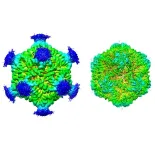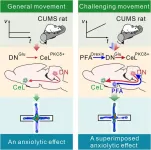(Press-News.org) RICHMOND, Va. (Jan. 31, 2024) – As many as 10% of older U.S. veterans diagnosed with dementia may suffer instead from reversible cognitive decline caused by advanced liver disease, according to an analysis from the Virginia Commonwealth University’s School of Medicine and the Richmond VA Medical Center.
It can be difficult for physicians to differentiate dementia from the cognitive decline caused by cirrhosis, called hepatic encephalopathy. If undetected, patients may not receive appropriate treatment that can reverse or halt the impairment. The study, published in the journal JAMA Network Open, sought to learn more about the prevalence and risk factors of undiagnosed cirrhosis and potential encephalopathy in veterans with dementia.
The findings suggest that physicians treating veterans with dementia, even without a cirrhosis diagnosis, should consider assessing their patients for liver disease. Identifying cirrhosis early on may unveil reversible causes of cognitive impairment, potentially improving the lives of these patients.
“This unexpected link between dementia and liver health emphasizes the importance of screening patients for potentially treatable contributors to cognitive decline,” said lead author Jasmohan Bajaj, M.D., a gastroenterologist and world-renowned expert in hepatic encephalopathy with the VCU Stravitz-Sanyal Institute for Liver Disease and Metabolic Health and the Richmond VA Medical Center.
The researchers believe the findings would apply to non-veterans with dementia, but further research is needed. Bajaj urges clinicians, especially those who encounter patients with dementia, to incorporate liver assessments into routine care for their patients.
“Early detection of liver issues allows for targeted interventions and opens avenues for addressing treatable factors contributing to cognitive decline,” he said.
Hepatic encephalopathy is a nervous system disorder brought on by cirrhosis, an advanced form of liver disease in which patients experience severe scarring of the liver. When the liver doesn’t work properly, toxins build up in the blood. These toxins can travel to the brain and affect brain function, leaving patients confused or delirious. Widely available medications can readily rid the body of toxins and reverse this condition, but without treatment, patients can lapse into coma or die.
Bajaj said the study was sparked by the cases of two older men who were thought to have dementia and Parkinson’s disease, but whose symptoms dramatically improved after being treated for hepatic encephalopathy. One of the men recovered to the point where he resumed driving. Bajaj and colleagues continued to pursue this link between dementia and cirrhosis, publishing findings in 2023 that about 8% of U.S. veterans with cirrhosis had dementia.
To look at the flip side, the new study’s authors reviewed medical records of 177,422 U.S. veterans diagnosed with dementia but not cirrhosis between 2009 and 2019. The veterans studied were patients from all across the VA medical system. Roughly 30% of veterans suffer from some form of liver disease.
Participants were overwhelmingly male, with an average age of 78, and evaluated using the Fibrosis-4, or FIB-4, score. The FIB-4 score, an initial screening index for most liver diseases that is based on multiple measurements, including age, is recommended by leading liver, gastroenterology and endocrinology associations as a first-line test to screen for liver fibrosis in the general population. The FIB-4 score was developed by VCU Health hepatologist Richard Sterling, M.D., who is the chief clinical officer of the Stravitz-Sanyal Institute for Liver Disease and Metabolic Health.
The study revealed that 10.3% of veterans with dementia had high FIB-4 scores, meaning they were very likely to have cirrhosis. Factors that increase the risk of cirrhosis include older age, being male, congestive heart failure, viral hepatitis, alcohol use and certain health conditions.
Notably, the data showed that dementia disproportionately affected Black and Hispanic veterans, who also were more likely to be diagnosed later in the disease course. Non-Hispanic white veterans who did not use tobacco or had diabetes were less likely to have elevated FIB-4 scores.
The researchers conducted a follow up study at the Richmond VA Medical Center to validate their findings and found similar results, with as many as 11.2% of the patients having high FIB-4 scores.
“The next step is to ensure that health care providers taking care of patients with cirrhosis and well as those with dementia are made aware of a potential overlap with hepatic encephalopathy, which is treatable,” said Bajaj, who has spent the past several years focusing on hepatic encephalopathy and the gut-brain axis.
“Routinely using the FIB-4 index to evaluate dementia could help a significant number of patients, families and physicians by providing an opportunity to treat and potentially reverse cognitive impairment brought on by liver disease,” he added.
END
1 of 10 veterans diagnosed with dementia may instead have cognitive decline from cirrhosis
Team at VCU School of Medicine and Richmond VA Medical Center unravels connection between dementia and liver health
2024-01-31
ELSE PRESS RELEASES FROM THIS DATE:
Leisure-time physical activity and falls with and without injuries among older women
2024-01-31
About The Study: Participation in leisure-time physical activity at the recommended level or above was associated with lower odds of both non-injurious and injurious falls in this study of 7,100 older women. Brisk walking and both moderate and moderate-vigorous leisure-time physical activity were associated with lower odds of non-injurious falls.
Authors: Wing S. Kwok, B.App.Sc., of the University of Sydney in Sydney, Australia, is the corresponding author.
To access the embargoed study: Visit our For The Media website ...
Oxford scientists launch ambitious roadmap for circular carbon plastics economy
2024-01-31
Researchers from the Oxford Martin Programme on the Future of Plastics, University of Oxford, have outlined ambitious targets to help deliver a sustainable and net zero plastic economy. In a paper published in Nature, the authors argue for a rethinking of the technical, economic, and policy paradigms that have entrenched the status-quo, one of rising carbon emissions and uncontrolled pollution.
Currently the global plastics system results in over 1 gigatonnes per annum (Gt/annum) of carbon dioxide equivalent emissions which is the same as the total combined emissions ...
Molecule can quickly, and briefly, boost white blood cell counts
2024-01-31
New Haven, Conn. — Treatment with a molecule known as A485 can quickly and temporarily increase levels of white blood cells, a critical part of the body’s immune system, an effect that is difficult to deliver with currently available pharmaceuticals, a new Yale study finds.
In an experiment, the researchers found that exposure to the molecule in mice caused white blood cells to mobilize from the bone marrow, a response that could inform future treatment for patients who need a boost in immune activity, the researchers say.
The findings were reported Jan. 31 in the journal ...
When and how immune cells decide to form pathogen memories
2024-01-31
Unexpected findings have emerged about how and when certain infection-killing white blood cells decide to form memories about their encounters with a pathogen.
It has been known for decades that these cells can turn themselves into durable memory cells that can survive a long time after an initial infection is cleared. They are prepared to quickly recognize and eliminate future intrusions by the same kind of pathogen.
That is one reason people are resistant to some infectious diseases after exposure to or recovery from the illness. Vaccinations also work this ...
Whole blood transfusion improves survival during traumatic bleeding
2024-01-31
(Boston)—Significant bleeding due to traumatic injury is the number one cause of preventable deaths in the U.S., with the majority of deaths occurring within six hours. Emerging evidence suggests that the transfusion of whole blood (blood that is not separated into parts) is associated with a survival benefit compared to the traditional use of blood component transfusion (red blood cells, plasma, and platelets) in these patients.
A new study from researchers from Boston University Chobanian & Avedisian School of ...
Combination drug therapy shows promise for a treatment-resistant cancer
2024-01-31
FOR IMMEDIATE RELEASE
A combination of two cancer drugs could be effective against malignant peripheral nerve sheath tumors (MPNSTs) — soft tissue tumors that are stubbornly resistant to chemotherapy and radiation — according to a laboratory study led by researchers at the Johns Hopkins Kimmel Cancer Center.
Both drugs interfere with cell growth and replication but have different mechanisms of action. Used together, they suppressed the growth of MPNSTs in mouse models of human disease, the researchers found. The findings were published ...
Decarbonizing the world’s industries
2024-01-31
Harmful emissions from the industrial sector could be reduced by up to 85% across the world, according to new research.
The sector, which includes iron and steel, chemicals, cement, and food and drink, emits around a quarter of global greenhouse gas (GHG) emissions - planet-warming gases that result in climate change and extreme weather.
This new study, led by the University of Leeds as part of its contribution to the UK Energy Research Centre (UKERC), found that decarbonising the sector is technically possible with a mix of “high and low-maturity” technologies - those that are tried and tested, along with upcoming tech that is not yet ready to be used in industry.
Lead ...
Brain protein’s virus-like structure may help explain cancer-induced memory loss
2024-01-31
In a rare but serious complication of cancer, the body’s own immune system can start attacking the brain, causing rapid-onset memory loss and cognitive deficits. What triggers this sudden biological civil war was largely unknown.
Now, researchers at University of Utah Health have found that some tumors can release a protein that looks like a virus, kickstarting an out-of-control immune reaction that may damage brain cells.
Their findings published in Cell on Jan. 31, 2024.
A rapid immune attack
Jason Shepherd, Ph.D., associate ...
Study finds brain mechanism for physical exercise improving mood
2024-01-31
"Only exercise can remove all kinds of doubts," Goethe said. Physical exercise is the lubricant between the body and the mind. Alleviation of anxiety by motor activity forms an integral part of our daily life; whether going for a walk to refresh our mind or running excessively in the park to recuperate from a stressful event, we are all well aware of the beneficial impact. In fact, the plain view that exercise can prevent anxiety and depression has been supported by accumulating prospective cohort studies in recent years. Yet, apart from some general interactions between the periphery of our body and our ...
Symbiotic autonomous robot ecosystem enhances safety and efficiency on nuclear facilities decommissioning
2024-01-31
Nuclear facilities, particularly during decommissioning, face significant challenges due to hazardous materials and environments. Traditional methods often rely heavily on human intervention, posing risks and inefficiencies. A groundbreaking research introduces a symbiotic autonomous robot ecosystem, designed to transform nuclear facility decommissioning. This innovative approach leverages a Cyber-Physical System (CPS) coordinated through a digital twin interface, significantly enhancing safety, efficiency, and operational awareness ...
LAST 30 PRESS RELEASES:
GLP-1 drugs associated with reduced need for emergency care for migraine
New knowledge on heritability paves the way for better treatment of people with chronic inflammatory bowel disease
Under the Lens: Microbiologists Nicola Holden and Gil Domingue weigh in on the raw milk debate
Science reveals why you can’t resist a snack – even when you’re full
Kidney cancer study finds belzutifan plus pembrolizumab post-surgery helps patients at high risk for relapse stay cancer-free longer
Alkali cation effects in electrochemical carbon dioxide reduction
Test platforms for charging wireless cars now fit on a bench
$3 million NIH grant funds national study of Medicare Advantage’s benefit expansion into social supports
Amplified Sciences achieves CAP accreditation for cutting-edge diagnostic lab
Fred Hutch announces 12 recipients of the annual Harold M. Weintraub Graduate Student Award
Native forest litter helps rebuild soil life in post-mining landscapes
Mountain soils in arid regions may emit more greenhouse gas as climate shifts, new study finds
Pairing biochar with other soil amendments could unlock stronger gains in soil health
Why do we get a skip in our step when we’re happy? Thank dopamine
UC Irvine scientists uncover cellular mechanism behind muscle repair
Platform to map living brain noninvasively takes next big step
Stress-testing the Cascadia Subduction Zone reveals variability that could impact how earthquakes spread
We may be underestimating the true carbon cost of northern wildfires
Blood test predicts which bladder cancer patients may safely skip surgery
Kennesaw State's Vijay Anand honored as National Academy of Inventors Senior Member
Recovery from whaling reveals the role of age in Humpback reproduction
Can the canny tick help prevent disease like MS and cancer?
Newcomer children show lower rates of emergency department use for non‑urgent conditions, study finds
Cognitive and neuropsychiatric function in former American football players
From trash to climate tech: rubber gloves find new life as carbon capturers materials
A step towards needed treatments for hantaviruses in new molecular map
Boys are more motivated, while girls are more compassionate?
Study identifies opposing roles for IL6 and IL6R in long-term mortality
AI accurately spots medical disorder from privacy-conscious hand images
Transient Pauli blocking for broadband ultrafast optical switching
[Press-News.org] 1 of 10 veterans diagnosed with dementia may instead have cognitive decline from cirrhosisTeam at VCU School of Medicine and Richmond VA Medical Center unravels connection between dementia and liver health




